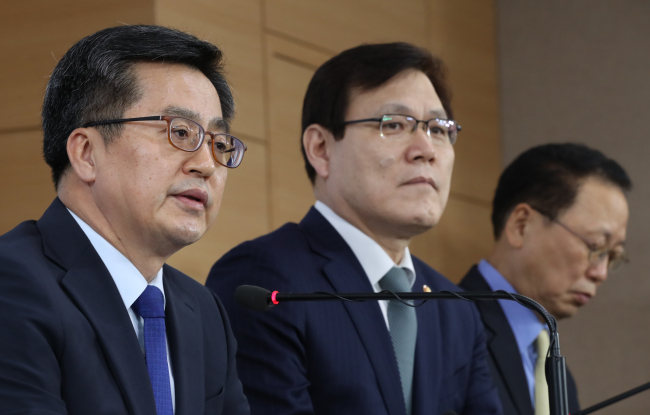South Korea to tighten loan rules to curb household debts
Borrowers to be classified into four groups based on repayment ability
By Bae Hyun-jungPublished : Oct. 24, 2017 - 17:53
The South Korean government on Tuesday came up with a comprehensive scheme to curb the nation’s whopping level of household debt by tightening loan availability for multiple-home owners and categorizing borrowers’ financial capacities to encourage debt repayment.
The regulations is a follow-up to the Aug. 2 real estate measures and aimed to crub the mounting household debt hovering at nearly 1,400 trillion won.
The regulations is a follow-up to the Aug. 2 real estate measures and aimed to crub the mounting household debt hovering at nearly 1,400 trillion won.

“The household debt issue is one of the core risks to our economy, as has been pointed out by the credit rating agencies,” said Deputy Prime Minister and Finance Minister Kim Dong-yeon in a joint press briefing.
“The possibility remains low that these debts will expand into a structural problem, but there is a growing need to respond pre-emptively to the rapid increase.”
The forthcoming hike of the nation’s key interest rate could also add pressure upon the financially vulnerable clusters and owner-operators, the minister added.
The joint press conference, held at Seoul Government Complex presided by the finance minister, was attended by Land, Infrastructure and Transport Minister Kim Hyun-mee, Financial Services Commission Chairman Choi Jong-ku, Financial Supervisory Service Gov. Choe Heung-sik, and Bank of Korea Senior Deputy Governor Yoon Myun-shik.
In order to address household debts, which amounted to 1,388 trillion won ($1,229 billion) as of the second quarter, the government decided to reinforce loan appraisal standards based on the borrower’s actual financial capacities.
The key principle is that people should be allowed to borrow money within their repayment capacities, according to Minister Kim.
The government’s goal is to keep the household debt increase rate by 0.5-1 percentage point lower than the current forecast, until the annual increase rate drops from the current double-digit level to 8 percent.
Related measures included a reinforced debt to income ratio, as well as the introduction of a debt service ratio, both acting as deterrents to multi-house owners seeking to expand their assets on loans.
“We will carry out a new DTI system in the metropolitan region and designated bubble-prone zones, starting January next year to better reflect the borrower’s income and mortgage repayment range,” Kim said.
Under the current system, the DTI, limited to 40 percent of the annual income of a borrower, pertains to the principal and interest payment of a new home along with the interest payment for existing home (previous loan). The upcoming DTI, however, will also include the principal of exiting homes, which would make it nearly impossible for multiple home owners to take out mortgage loans to buy more, officials explained.
Also, banks will keep track of the DSR, looking into the overall burden of principal and interest payments of all loans against the annual income.
The system will be introduced in banks, starting from the second half of next year, and gradually expand into non-banking sectors as a new credit management index.
Seeking to induce debt repayment and to assist those financially challenged, the government classified borrowers into four different clusters based on financial capability and announced a tailored assistance for each of them.
While the top two groups will mostly be induced to restrain their debts within repayable range, the more vulnerable groups will be offered government support on credit recovery.
Those totally unable to pay back will be provided with debt write-offs, based on a thorough review of repayment ability.
“Of course, one should be held accountable for one’s own debts,” said FSC Chairman Choi, in response to concerns on possible moral hazard.
“But it is also indispensable for the sake of our capitalist economic order that these people should step out of their default and back gain their feet.”
As a protection measure for the socially disadvantaged clusters and owner-operators, the government will activate a separate fund support program, with the assistance of the Industrial Bank of Korea and the Small Enterprise and Market Service.
By Bae Hyun-jung (tellme@heraldcorp.com)








![[KH Explains] Hyundai's full hybrid edge to pay off amid slow transition to pure EVs](http://res.heraldm.com/phpwas/restmb_idxmake.php?idx=644&simg=/content/image/2024/04/18/20240418050645_0.jpg&u=20240419100350)






![[From the Scene] Monks, Buddhists hail return of remains of Buddhas](http://res.heraldm.com/phpwas/restmb_idxmake.php?idx=652&simg=/content/image/2024/04/19/20240419050617_0.jpg&u=20240419175937)

![[KH Explains] Hyundai's full hybrid edge to pay off amid slow transition to pure EVs](http://res.heraldm.com/phpwas/restmb_idxmake.php?idx=652&simg=/content/image/2024/04/18/20240418050645_0.jpg&u=20240419100350)

![[Today’s K-pop] Illit drops debut single remix](http://res.heraldm.com/phpwas/restmb_idxmake.php?idx=642&simg=/content/image/2024/04/19/20240419050612_0.jpg&u=)